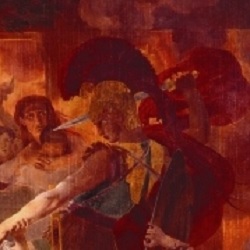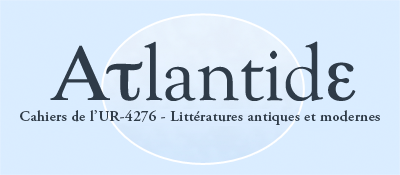 Ancient Drama and Contemporary Wars : the City Laid Waste ?
Ancient Drama and Contemporary Wars : the City Laid Waste ?
[Publication en ligne : 20 mars 2017]
Résumé : Si la représentation de la guerre dans la tragédie antique peut aussi intéresser la scène contemporaine, c’est en raison de la spécificité de sa dimension dramaturgique. Nous voudrions réfléchir à la possibilité pour la dramaturgie de la tragédie antique de nous aider à représenter/penser/ressentir la complexité et le caractère déroutant voire monstrueux des guerres contemporaines, et ce quelle que soit la séparation affirmée par Aristote entre tragédie et monstruosité. En quoi le théâtre contemporain peut-il chercher dans le théâtre antique une possibilité de toucher/transformer, lorsqu’il s’agit de la représentation de la guerre, individu et communauté ? Pour éviter l’émiettement des exemples, nous nous intéressons ici à trois mises en scène, celle des Troyennes par George Tabori à Brême en 1976, celles des Troyennes encore par Matthias Langhoff à Rennes en 1998 et celle des Perses par Dimitri Gotscheff à Berlin en 2006.
Mots-clés : tragédie grecque, Perses, Troyennes, scène contemporaine, guerre, Allemagne.
Abstract : If the representation of war in ancient tragedy may be of some relevance to the contemporary stage, it is because of the specificity of its dramatic dimension. We would like to reflect on the possibility for the dramaturgy of ancient tragedy to help us represent/envisage/feel the complexity and the disturbing, or even monstrous nature of contemporary wars, notwithstanding the separation, spelled by Aristotle, between tragedy and monstrosity. In what ways can contemporary drama seek, in ancient drama, a possibility of touching/transforming the individual and the community, when representing war ? To avoid too many examples we will deal with three productions : The Trojan Women, by George Tabori in Bremen in 1976, The Trojan Women again, by Matthias Langhoff in Rennes in 1998, and The Persians, by Dimitri Gotscheff in Berlin in 2006.
Keywords : greek tragedy, Persians, Trojan women, contemporary drama, war, Germany.
Pour citer cet article : Claire Lechevalier, « Ancient Drama and Contemporary Wars : the City Laid Waste ? », Violence tragique et guerres antiques au miroir du théâtre et du cinéma (XVIIe-XXIe siècles), Tiphaine Karsenti et Lucie Thévenet (dir.), Atlantide, n° 6, 2017, p. 42-49, http://atlantide.univ-nantes.fr
Articles dans le même numéro :
Avant-propos - Christian Biet & Fiona MacintoshIntroduction - Tiphaine Karsenti & Lucie Thévenet
Ancient Tragedy Violence in the French Translations of Greek Tragedies (1692-1785)
The So-called “Vogue” for Outdoor Theatre around the Time of the First World War : Meanings and Political Ambiguities of the Reference to Greek Theatre
Aeschylus’ Persians to Denounce Modern Greek Politics
War, Revolution and Drama : Staging Greek Tragedy in Contemporary Portugal
To Tell the Trojan War Today : Contemporary Performances of Agamemnon
Filmic Analogies : the Trojan War in the Present. Notes toward an African Oresteia (Pier Paolo Pasolini, 1969), Troy (Wolfgang Petersen, 2004)
The Obscenity of Violence, the Obscenity of Theatre. The Dramaturgy of Carmelo Bene’s Last performance disconcertment
Kleist’s Penthesilea : a Warrior Caught up by Tragedy
Volume intégral - Violence tragique et guerres antiques au miroir du théâtre et du cinéma (XVIIe-XXIe)
&


